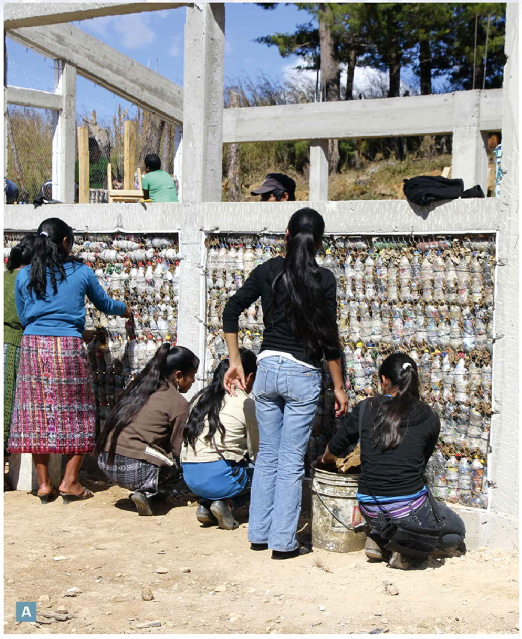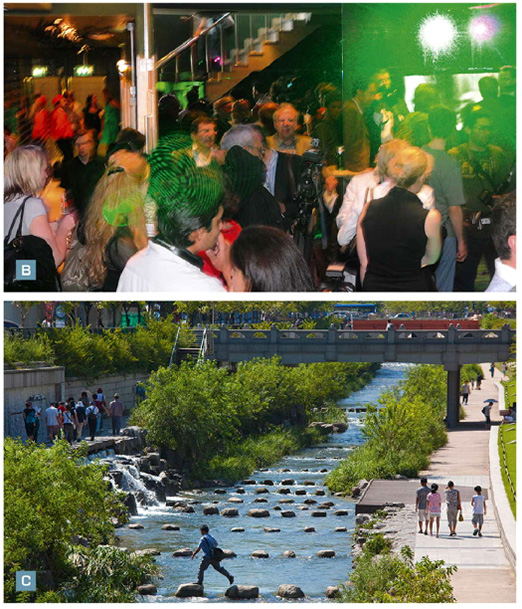Exercise 1
A. Look at photos A-C. What do you think is happening? Listen to the program to find out.


Answer & Audioscript
1 In photo A, people are building a school out of plastic bottles.
2 In photo B, people are generating energy for the nightclub by dancing on a special dance floor.
3 Photo C shows people in the Seoul River Park, which used to be a highway.
Audioscript
Hi, and welcome to Green Ideas. Now, the problem with some of the traditional ways of saving the environment is that they can be really boring. So, today we’re looking at ideas for protecting the environment that are a bit different, and we think they sound fun.
Our first project is called Hug it Forward. This great project started in Guatemala where communities decided to work together to build schools out of old plastic bottles. In the first project, over 1,800 kids from the region filled 10,000 plastic bottles with bits of plastic, food wrappers and other garbage or trash found on the streets. They then used the bottles as bricks to help build a school. By the time they had finished, they had a new school, and the area was a lot cleaner, too! Now the idea is spreading, and around the world more communities are using the bottle school technology to build their own schools. What a fantastic idea!
And here’s an idea for those of you who enjoy going out clubbing. The Surya nightclub in London was one of the first eco-friendly nightclubs in the U.K. The club has a special dance floor that uses the movement people make when they dance to generate energy. The dancers manage to produce 60 per cent of the energy that the club uses for light and music. The owner of the eco-club had another great idea. If you walk or cycle to the club, rather than using a car or public transportation, you get free entry. I love it.
And our final idea for today is the story of the Seoul River Park. It’s getting more and more difficult to find green spaces in cities, so, when Dr. Kee Hwang had a “crazy” idea to take down the city’s main highway and uncover the river that flowed below to make a green park, most people thought he was crazy. They told him that his idea would create traffic chaos and would be a disaster for the area. But Dr. Hwang went ahead with the project and created the 5.8 kilometer green river park. It’s a place where the residents of Seoul can walk, relax and really enjoy the city. And do you know what? People are happier, and there’s a lot less traffic chaos than before! It just shows that sometimes even the craziest ideas can work.
Exercise 2
A. Listen to two people discussing the questions in the quiz. As you listen, note the correct answers.
QUIZ: Man & Animals
WHY…
1 do we use rats after an earthquake?
2 do some prisons use abandoned dogs?
3 does the army use dolphins?
4 did airport security plan to use gerbils in the 1970s?
5 do we use seals for research in the ocean?
Answer & Audioscript
1 Rats are used to rescue people. They can move in small spaces, and they have a good sense of smell, so they can find people.
2 Abandoned dogs are taken to prisons, and then the prison inmates take care of them until the dogs are adopted.
3 Dolphins are used to protect areas of water. They can detect swimmers who shouldn’t be there.
4 Gerbils can smell people’s adrenaline when people are excited, scared or angry. The airport security bosses hoped the gerbils would smell terrorists or other criminals in airports.
5 Seals can dive deep down into freezing water. Scientists can attach research equipment to the seals’ bodies.
Audioscript
M: Why do we use rats after an earthquake? I’m not sure. It might be to help find people or other animals?
W: Yeah, they’re used to rescue people. They can move in small spaces, and they have a good sense of smell, so they can find people.
M: Why do some prisons use abandoned dogs? Mmmm, let me think. It could be as prison guards. Maybe they use the dogs to guard the prisoners? Actually, no, it can’t be that because they’d be trained dogs, not abandoned dogs. I don’t know.
W: OK. It says: it was a program that started some years ago. Abandoned dogs are taken to prisons, and then the prison inmates take care of them until the dogs are adopted.
M: Why does the army use dolphins? It’s definitely not to attack people because dolphins are kind of nice. Um, it’s hard to say. I really don’t know.
W: Dolphins are used to protect areas of water. They can detect swimmers who shouldn’t be there. A light is attached to the dolphin’s nose. The dolphin bumps into the swimmer, and the light falls off its nose. This tells the army where the swimmer is.
M: Why did airport security plan to use gerbils in the 1970s? Perhaps they can smell drugs or something like that?
W: Gerbils can smell people’s adrenaline. When someone is excited, scared, or angry, adrenaline is released by the body. The airport security bosses hoped the gerbils would smell terrorists or other criminals in airports. In the end, the idea was abandoned because gerbils didn’t know the difference between terrorists and people who were just scared of flying.
M: Why do we use seals for research in the ocean? Um… that’s a good question. It might be because they can live in very cold temperatures.
W: They can dive deep down into freezing water. Scientists can attach research equipment to the seals’ bodies, and this doesn’t stop the seals from diving and swimming.
Exercise 3
A. Listen to a woman talking about a natural place she visited and answer the questions.
1 Where is the place?
2 What is special about it?
Answer & Audioscript
Suggested Answers:
1 Fish River Canyon is in Namibia, Africa.
2 It is the second biggest canyon in the world. It is silent.
Audioscript
A: OK, the most beautiful place I’ve been to. Well, a few years ago I went to Fish River Canyon.
B: Where?
A: Fish River Canyon. It’s the second biggest canyon in the world.
B: After the Grand Canyon?
A: After the Grand Canyon.
B: Where is it?
A: It’s in Namibia, in Africa.
B: Wow. And what did you think of it?
A: It was amazing. The first thing you notice is how big it is, of course.
B: Of course.
A: It just goes on and on as far as your eye can see. But the best thing about it was the silence.
B: Really?
A: It was so amazingly quiet. We went there in August and there weren’t many tourists and it was just so quiet.
B: Would you like to go back?
A: I would love to go back. One day!
B: One day.
Exercise 4
A. Listen and match statements a)—d) with speakers 1—4.
a) He/She has spent a lot of time in the yard.
b) He/She lives on a farm.
c) He/She lives near a beach.
d) He/She comes from the U.S.A.
B. Listen again and answer the questions. Do not use more than three words for each answer.
1 a) Whom does the speaker go for walks with these days?
…………………………………………
b) What did she see on the beach once?
…………………………………………
2 a) What did the speaker invent as a child?
…………………………………………
b) Where does she say she “grew up”?
…………………………………………
3 a) When does the speaker go hiking and camping?
…………………………………………
b) What “big” things does he say that Americans like?
…………………………………………
4 a) What animals does the speaker work with?
…………………………………………
b) What doesn’t he like about living on a farm?
…………………………………………
Answer & Audioscript
A
a 2 b 4 c 1 d 3
B
1 a her dog; b a (dead) whale
2 a games; b in the garden
3 a in (the) summer; b spaces (and) skies
4 a chickens, cows, pigs; b getting up early
Audioscript
1 I’m lucky living by the ocean. Every morning, I see fishermen coming in after work. There’s always something to do because the ocean is always different. Every day, you see something different. When I was younger, we used to have parties and sleep on the beach. We cooked fish and listened to Bob Marley, and that was fun. These days, I still go for walks every day with my dog. We’ve seen dolphins here. And we saw a dead whale on the beach once. It was enormous. It was on the beach for weeks.
2 As a child, I played in a tree house in the yard. We were always outside. We invented games, and we knew the names of animals and insects. We played in our yard or in our friends’ yards. It was very safe in those days. You could be outside all day. When I was young, we didn’t have computers or even the television. And there wasn’t as much crime, so we really grew up in the yard.
3 I go hiking and camping in the mountains. You can do that here in the summer. In the winter, it’s too cold. I think Americans like me enjoy the wild. We like big spaces, big skies. I’m just a few miles from a city, but there are all kinds of plants and animals out here. You can see deer and bears. It’s pretty amazing.
4 I work with animals all the time. We have chickens, cows and pigs on the farm. There are a lot of farms around here, so it’s completely normal to see animals around. I really like feeding the pigs ’cause they’re quite funny to watch. One thing I don’t like is getting up early. We do it every day. We get up at five in the morning, and I’m always half asleep.
Related Posts
- Practice Listening English Exercises for B1 – World
- Practice Listening English Exercises for B1 – History
- Practice Listening English Exercises for B1 – Communities
- Practice Listening English Exercises for B1 – Success
- Practice Listening English Exercises for B1 – Emotion
- Practice Listening English Exercises for B1 – Solutions
